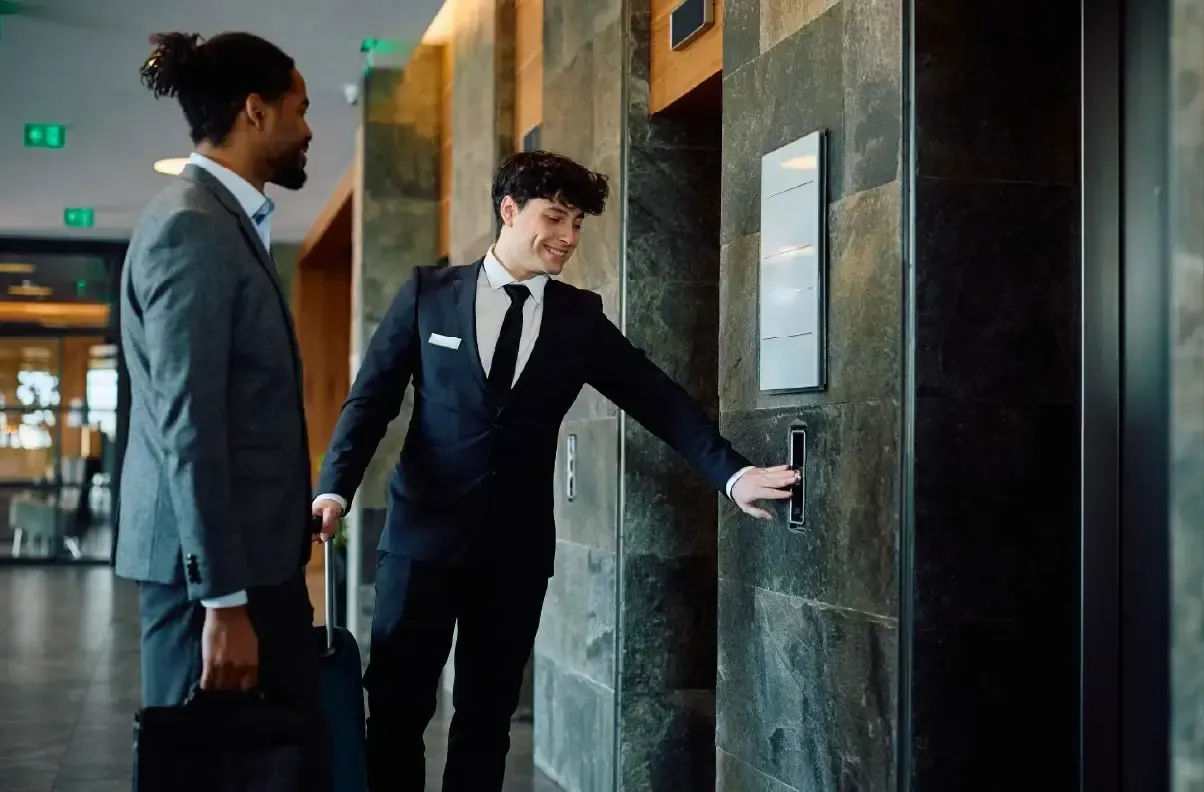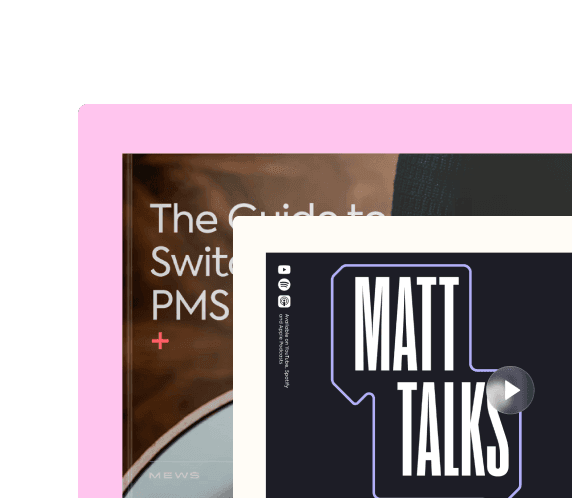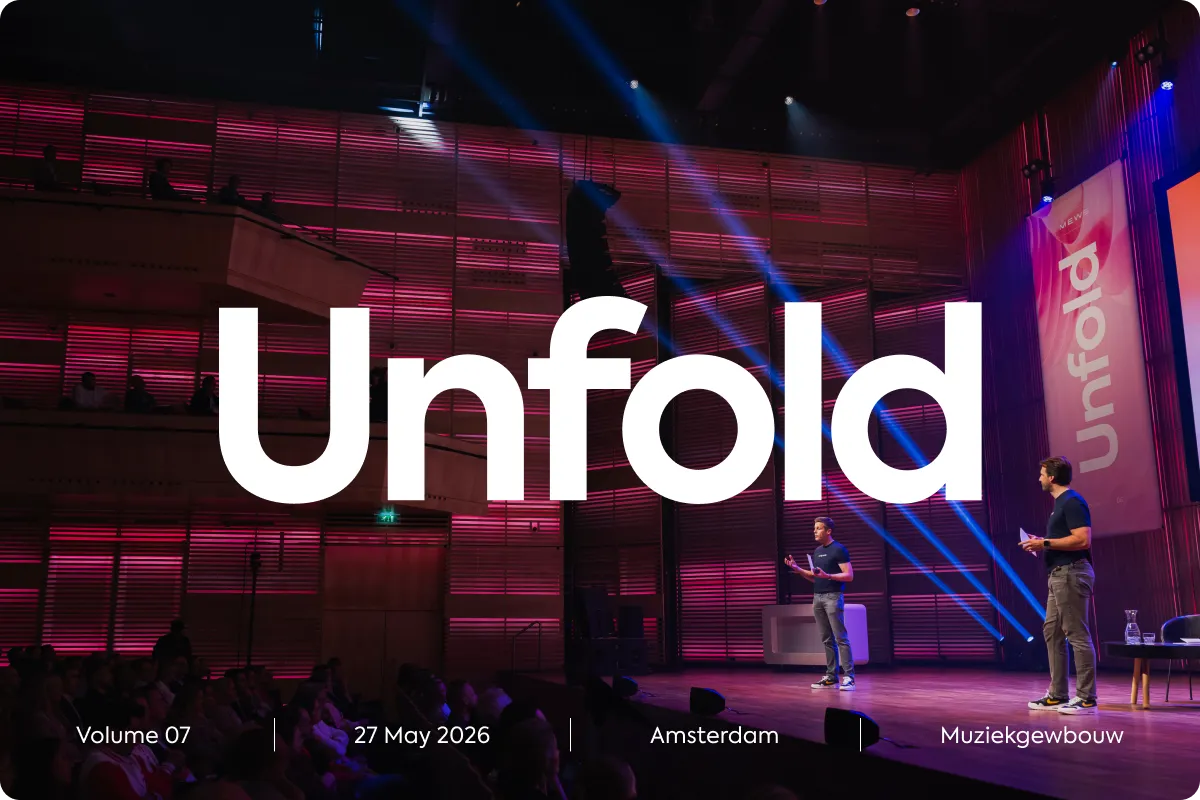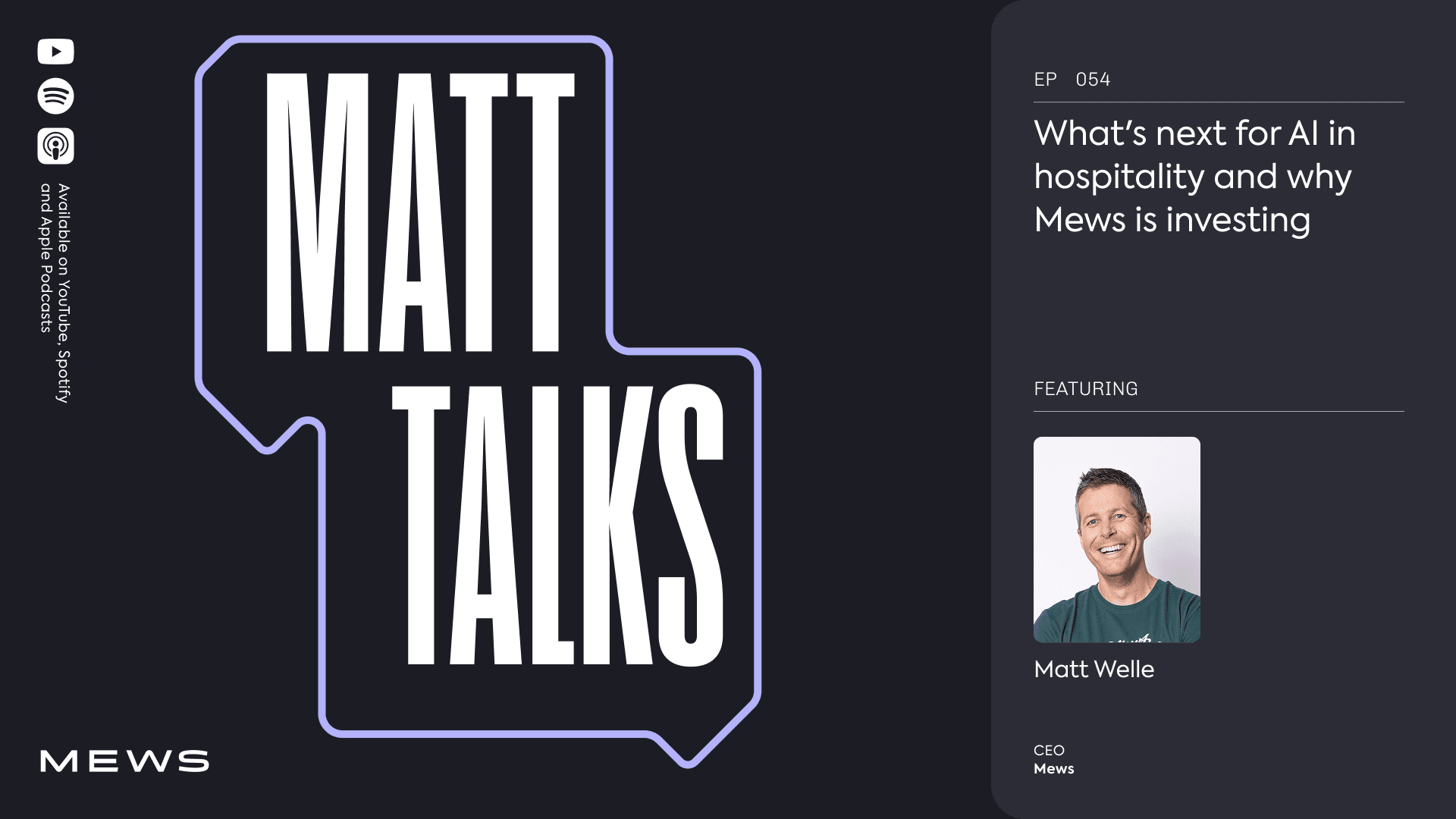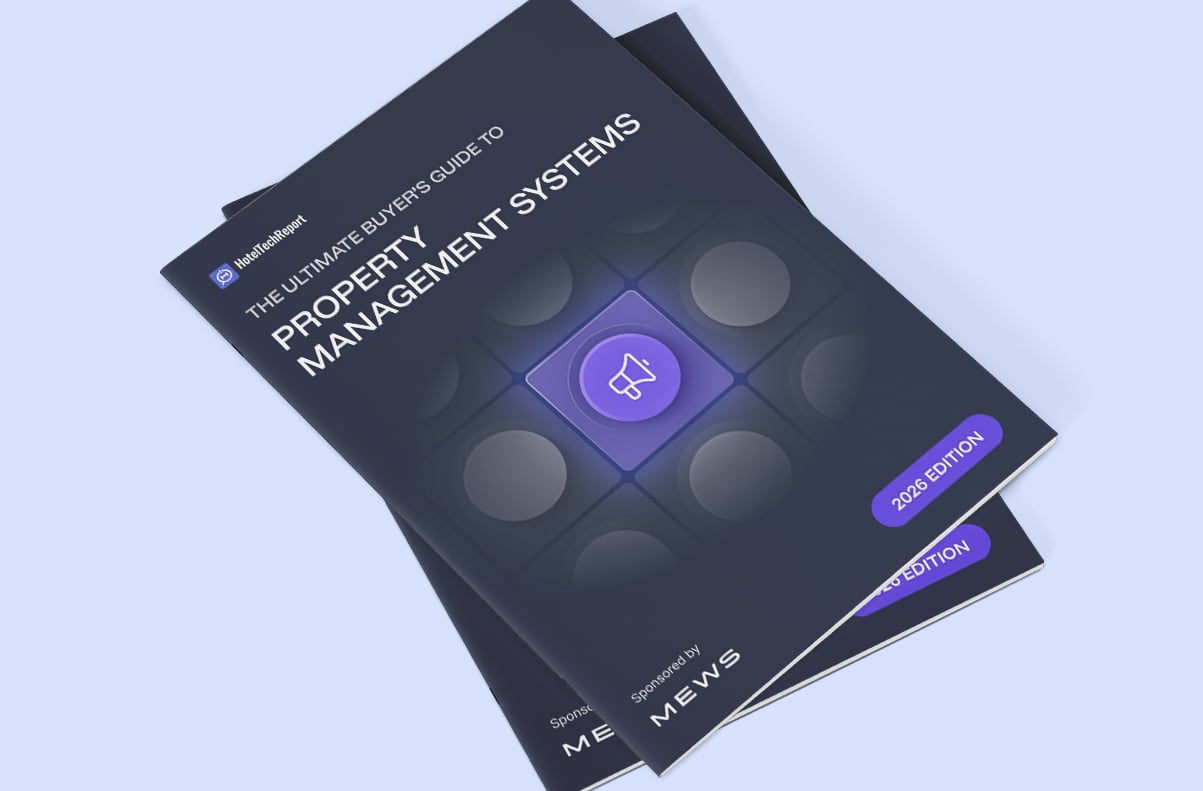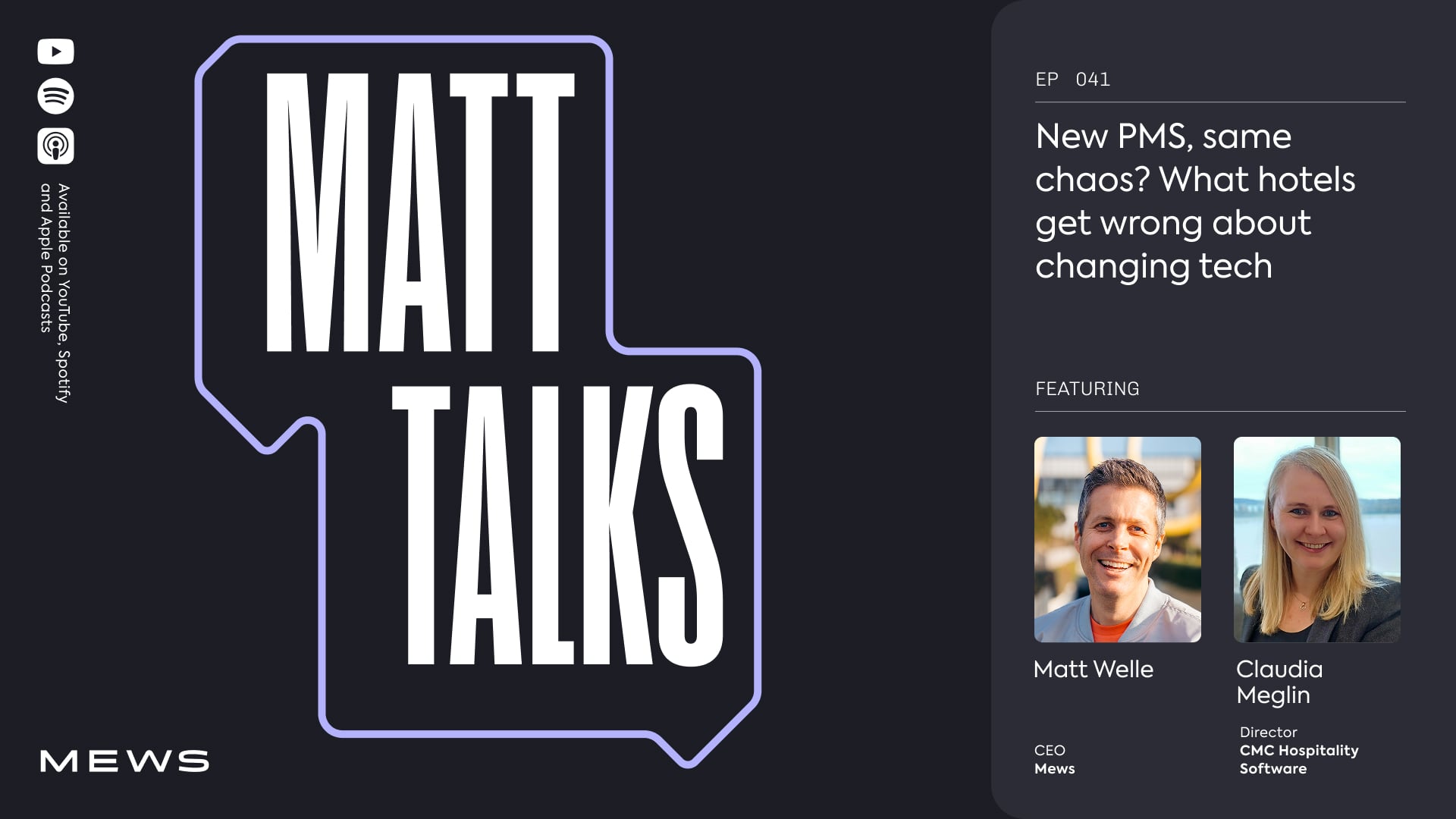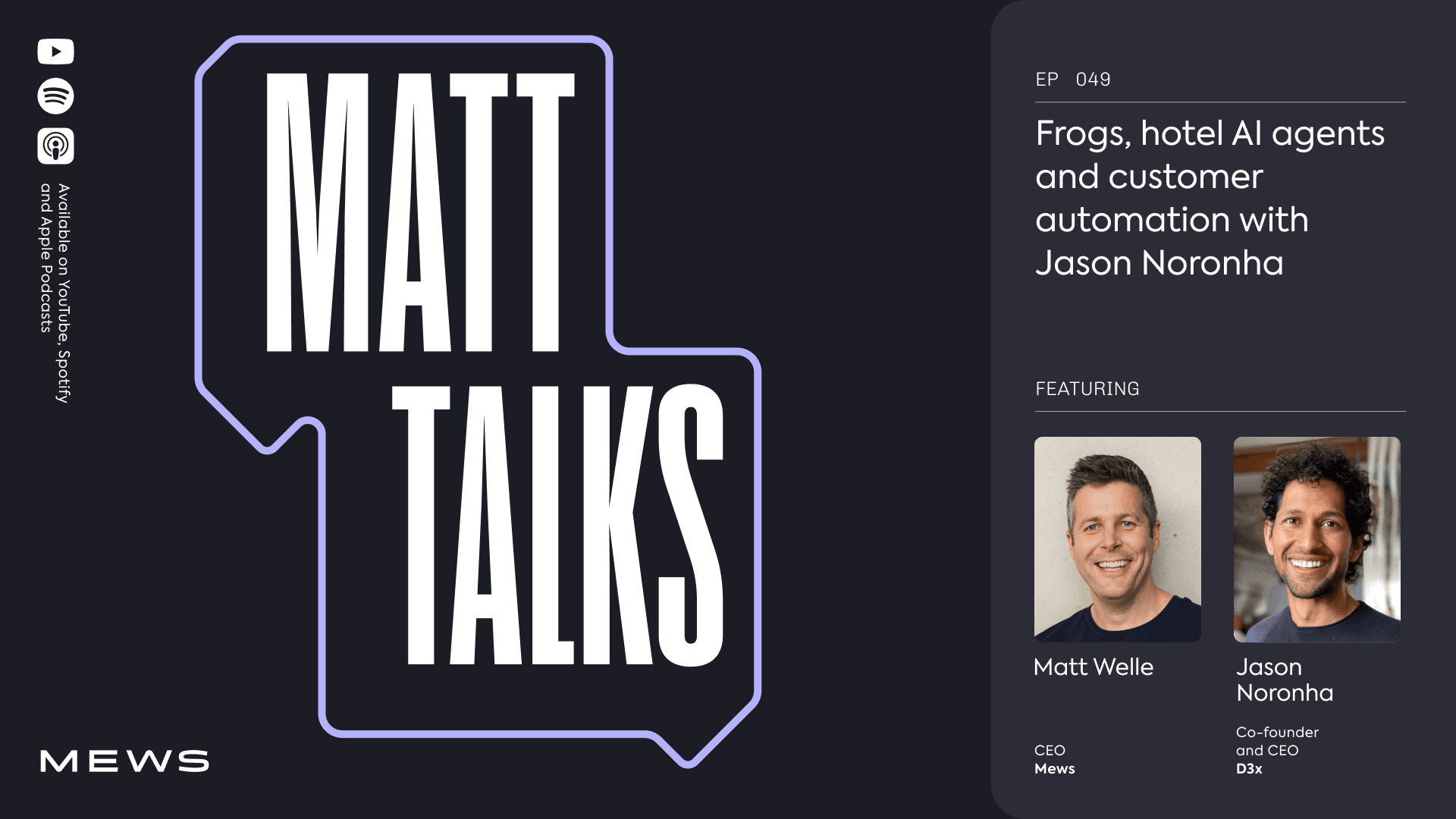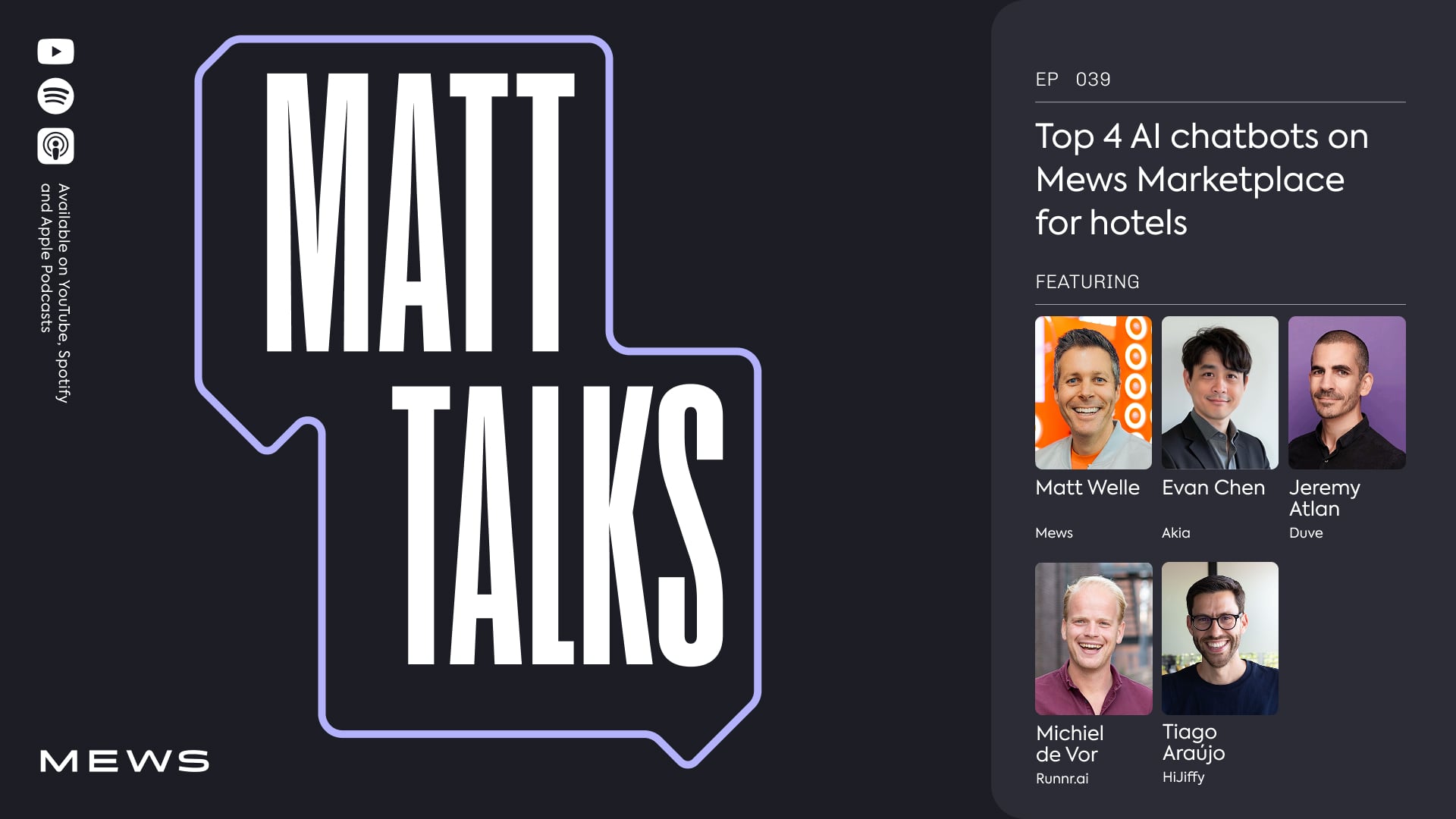What to expect?
Meet your host

Matthijs Welle
CEO, Mews
After years in the trenches of hospitality, Matt joined the Mews journey during its early days in 2013. Since then, he’s been our fearless CEO, leading the company and the industry forward.
Episode chapters
Transcript
[00:00:00] And in the next few months, you'll see a real change happening to hospitality, to those hoteliers that have invested into their architecture, into a cloud-first native platform like Mews, and starting to really see the benefits of those decisions that they made a couple of years ago.
[00:00:27] Hi everyone. Welcome back to another Matt Talks Hospitality. And this week I want to talk about artificial intelligence in hospitality. Not a topic that I haven't talked about before, but I wanna talk about it specifically because if you've been seeing what's happening on the internet, we have just acquired a first company called DataChat.
[00:00:44] It is a group of people that have been building AI native solutions for over five years, and we wanted to bring them in to really transform the efforts that we have made in the last couple of years and accelerate that roadmap because, I think a lot of people are wondering when the impact of AI is coming to hotels.
[00:01:02] Sure, we've seen really nice applications of chatbots and some light applications of AI, but it hasn't been transformative and a lot of hotels are still unfortunately doing a lot of things by hand, and that is still painful. It needs to change, and I think that acceleration is now coming, and in the next few months, you'll see a real change happening to hospitality, to those hoteliers that have invested into their architecture, into a cloud-first native platform like Mews and starting to really see the benefits of those decisions that they made a couple of years ago.
[00:01:35] One of the things that I often do when I go into a hotel cross-exposure is to first, the first question I always ask is, can I see your checklist? What are all the things that you have to check manually because your systems can't do them automatically?
[00:01:48] And every receptionist that I speak to smiles because they know exactly which checklist I'm speaking about and they show it to me. And it is the simple things of checking all the arrivals for today for their VIP statuses and ensuring that room services is where, which rooms need to get the fruit basket, for example.
[00:02:05] It has requests about all of the room requests for baby cots. And they need to make sure that housekeeping is aware which room numbers they need to prepare for a family with a baby coming in. It's the special request for birthday cakes in rooms, et cetera. And all of these notes are textual notes that are attached to reservations.
[00:02:22] And it means that a human has to get involved and navigate the complex landscape of systems that sit around the hotel to pass these tasks along to the correct departments. And as they go about their day, the phone will ring and more complex workflows come in. You know, it might be someone calling to make a room service order.
[00:02:40] So then you've gotta take that order and pass it along to the room service department. It might be a call from a guest who says, you know, we ran outta shower soap. Can someone bring more shower soap? Or can a bellboy come and pick up my luggage? And all of these requests are manual and it requires the human to navigate the complexity of the ecosystem of apps that the hotel runs on and sometimes it's just a piece of paper.
[00:02:59] This is really where I think the transformation of AI is going to come in the next year. So whilst a lot of the noise on the internet is hype, I think that there's a lot of noise around how AI is already transforming different industries. It isn't doing it fast enough, and it hasn't had a massive impact on hospitality.
[00:03:20] But I think with the exciting acquisition of DataChat that we have just done with the ecosystem that we've been building, the real transformation is coming today to those hoteliers that have invested into a modern tech stack for their hotels. In this Matt Talk episode, I wanted to demystify some of it because I think we're all getting confused about all of the terminology.
[00:03:40] What is a semantic layer? What is machine learning? What is generative AI? So what I wanted to do is just break it down. What are the core components of success for a hotel that is leaning into an AI first strategy? How do you leverage it and what is going to come your way if you set up the right ecosystem infrastructure for your particular hotel?
[00:03:58] And as a hotelier, I also struggle with a lot of terminology, so I will try and explain it in layman terms so that you understand what we're doing as a company and really where we're navigating toward because I think it is genuinely one of the most exciting times for hospitality and hopefully, we will build greater hospitality through these platforms.
[00:04:17] We will make sure that we recognize customers that we serve, what they're looking to get served, and without questions, we anticipate what they want because last time when they stayed at a sister hotel, we knew that they liked the specific pillow type, and we can now just pay those kind of requests through this really rich kind of data architecture that we're building and then overlaying it with this really fantastic AI tool that operates and makes sure that these guest requests are being listened to so that you can spend more time with your guests to create those really special experiences.
[00:04:48] I hope you enjoy this. So first of all, I think it's important to understand why hospitality is struggling so much with their systems. And we have struggled with these systems for the last few years, and very few hotel companies have truly innovated. And for us, this became very obvious 12 years ago when we tried to open our first hotel, the Emblem in Prague.
[00:05:10] And when we tried to open that itself, we had built a really fantastic guest app because really, we just cared about the guest experience and we wanted to make that really smooth. The moment we started to ask the industry-leading partners on the PMS side said, can we get access to your APIs documentation so we can build our app and integrate it with your platform so we can get all the guest data to flow seamlessly between the two systems?
[00:05:33] And the answer was no. You can't get access to the API. If you want access, it's gonna cost you a lot of money. And we didn't have a lot of money. So the decision we made was if we're struggling as an app, everyone else must be struggling in this industry. So why don't we just do the really, really hard thing, which is rebuild the core architecture of a hotel system in the cloud with an open API.
[00:05:54] And we just started building the PMS in the cloud because we saw what was out there available and it wasn't very good and it wasn't very future thinking. Those first three years were the hardest years, because no investor wants to invest in these two guys with a few developers who had this dream of rebuilding and competing against an industry leader.
[00:06:15] One of the most valuable companies in the world, and they were going to transform hospitality tech, I don't think so. And they kept telling us, stop building the architecture, start building this really nice light app that can sit on top of their architecture. And we just didn't believe that that was the answer, because we knew that this was the first step in a chess game that we were going to win and we intended to win.
[00:06:37] And it was a really critical component to the success that we see today. Another major decision that we made into our data foundation was putting the guest at the heart of the architecture. All of the legacy systems that I worked with back in the day had thought about the room as this core architecture piece.
[00:06:55] So you'd have a 100 bedroom hotel, you'd have a system with 100 rooms, and then, reservations are being attached to those rooms. They have to be checked out. We said no. The guest profile is really critical to transforming guest experiences, and if we don't make that the core components, then the guest history is not like centralized.
[00:07:13] So across the hotel chain, you don't have a centralized history of the guest and it's this experience. Have you been with us before? And why the hotel doesn't know this is because their architecture doesn't operate in the way that a modern property management system should. So that was the second decision we made.
[00:07:31] The third decision was opening up our API, meaning we allow external developers to build towards our system. And that worked wonders because today we have a thousand integrations in every category that you can imagine that can pull data from our system. And one of the other parts that's been a real struggle that we still encounter with hotels that have not decided to upgrade into the cloud in a cloud-native system is that their architecture is built with systems that don't fully integrate.
[00:07:58] So you might have the PMS at the core. You might have a central reservation system that has some level of integration. Then you have a housekeeping tool that might have a one-way integration where data pulls from the PMS to the housekeeping solution and some accounting systems will have a data file move across, but it isn't a full two-way connectivity.
[00:08:15] That kind of tech stack is starting to break at this point, and it will break faster than ever before because suddenly there are systems that can transform the way hotels operate. One of the critical components of that legacy architecture is that a lot of the reporting is being run from a data lake, a data lake that sits outside of their core system, the PMS.
[00:08:37] They collect the data from all of these different systems, which then sit outside and they can run fantastic reports, but the reports are only actionable if a human gets involved and takes action. Whereas if you move all of that data into the core architecture, into the Mews PMS, which is the core piece of guests and actionable revenue data, suddenly the PMS is the system that can also drive action.
[00:09:02] Because we sit on the data, we know what's going to happen, we are also the operational action system. And this is starting to tie all these pieces together. So this is where we can see a real transformation going to happen in the coming year in hospitality with AI and to all of those people that have been wondering, where is the innovation?
[00:09:22] I think that's where we're just turning a really exciting corner, and I'll talk through some of these scenarios in the next step. The evolution of AI in hospitality, and we've been talking about automation for a very long time, and some, even in the legacy systems, when I operated on a DOS base, like one of those blue screen systems, we already had some automation built into the workflows.
[00:09:44] Things like routing rules, for example, where we knew that if a group had routing rules for all non-alcoholic drinks to go to the master, but the alcoholic bill to the personal bill, that was a level of automation that we had. It was quite basic, but it worked quite well. So automation is really the first kind of line of defense that hotels have, which is basically automation rules that are very kind of rudimentary in making decisions.
[00:10:07] So some of the revenue systems out there today are not genuine AI-driven revenue management systems. They just say, if your occupancy picks up to 80%, then increase the price by €10. It's a very rudimentary kind of rule-based, kind of, engine. That exists and it does the job well, but it doesn't really give the significant upside that you're gonna get from a genuine generative AI kind of solution.
[00:10:32] Automation is the core component and you can achieve a lot with automation. All these rules, routing rules, rule-based occupancy, etcetera. It's a really good start. And if you've come from nothing, from an Excel sheet, or from a really old legacy system, it will definitely put you ahead of some of the others with this automation, rule-based logic.
[00:10:50] But this is not AI. This is just automation of the most painful processes that are happening in the hotel. Machine learning has come in a couple of years ago, and we've been talking about machine learning for quite some time actually, and this is the impact in hospitality you mostly see with revenue management systems.
[00:11:07] Machine learning means we're finding patterns in the data. So not only are we seeing the data and we're actioning it like an automation rule, we're also finding patterns and based on the patterns, we can change our decisioning. And this is where some of them, modern revenue management systems are functioning, so they are seeing these patterns in the data and then they can make a pricing decision based on that pattern.
[00:11:29] That and, you know, a year ago, it would've had less data. So, it may have made a different pricing decision than it would do today on the incremental data that you're seeing. So machine learning is this continuous absorption of data patterns that will happen. Revenue management is a great tool to then start to act on some of those data patterns that we're seeing.
[00:11:50] Machine learning has evolved, so we're seeing now, for example, generative AI is basically seeing more and more data and suddenly generative AI has access to the world's data. And it's really starting to create new content. So not only is it starting to make some pricing decisions like you would do with machine learning, like now this next level of generative AI is being able to consume the world's data or the data that it has access to, and it starts to create new contents.
[00:12:19] A really good example here is chatbots. Chatbots, five years ago, were godawful. It could not answer basic questions. The moment you asked your question in a slightly different way, the chatbot got confused and started to hallucinate, and it gave you completely wrong answers today because this generative AI, having consuming so much information from the world that it can make a very good guess about what your question will be about and therefore get it right 99.x% of the time.
[00:12:47] So a lot of the transformation we've seen in the recent three years has been around chatbots and the ability to very quickly interpret what you're asking for and then action with a response. It can give you an answer to your question.
[00:13:00] This new wave that's come in the last few months is really agentic AI, which is not only consuming a huge amount of information and then giving you an answer, it can action the answer. A really good example will be, someone asks for, in a chat app, for a shower gel, for example, the example I gave you earlier, they ran outta shower gel, they message the reception. The app cannot consume, saying, okay, the guest is in room 101 because I can see in their CRM profile that Mr. Jones, who's messaging with this phone number is in room 101. I need to go into the housekeeping system and see if there's an API for shower gel requests or create a task for shower gel.
[00:13:38] They put the request into the housekeeping system. They go back to the chat app and then message the guests so it can consume all of the context, it can read what people say, it can interpret what it means. It can then link it back to the system in the ecosystem, and it can action that entire workflow.
[00:13:53] That workflow would've been a human, that message would've gone to a human who has all of that context in their head and needs to translate it. And this is where, with this evolution towards agentic AI, you need to be on a modern tech stack because it can consume all of the apps and have two-way connectivity through an API and it can naturally give tasks and operate across your hotel.
[00:14:22] And this is really why with Mews for the last couple of years, you've seen us, you know, develop our APIs that marketplace partners can get there but we've also been acquiring several companies in the space where we know that they are critical components to operation.
[00:14:34] The last being, Flexkeeping, a housekeeping management tool. A lot of the manual workflows are unfortunately created towards maintenance and housekeeping that are the connection piece between the reception and what happens on the floors of the hotel. And this is where agentic AI is going to come in. It's going to really transform the operation of a hotel the way that I earlier talked about the data lake, right?
[00:14:56] So a lot of hotels have figured out that their architecture is sold, that they can't have a data lake that sits at the core system because the core system doesn't think in that way. So they built this data lake but the data lake is outside of the operation. So if you want to enable agentic AI across your ecosystem, it just starts to break down because the silos of data never make it back into your core system.
[00:15:17] And you could build something, but it will be very painful to get it in place. And unfortunately, with the acceleration of, kind of, solutions coming to market, I don't think hotel companies will have time to rebuild this themselves. So this is kind of the evolution, how we went from automation to machine learning to then now talking about generative AI, which is really creating new content.
[00:15:39] And agentic AI is taking that content and actioning it across the hotels, right? So I have been talking about the kind of backbone, the history of Mews, where we started. I've explained kind of the AI models. Where does DataChat come into this entire kind of ecosystem play that we're playing? And one of the powerful things that we found when we started looking at what the team at DataChat had been building and the name suggest chats, right?
[00:16:04] But actually they'd gone far beyond chats, but that was the name that they set up when they started. What the solutions are they've been building is having a deep understanding of AI. And what they realized was that a lot of the AI was hallucinating, right? When we started with AI, you often got answers wrong and you couldn't really trust it.
[00:16:22] There's more trust, but when you go into smaller kinds of ecosystems like a hotel operation, it doesn't operate in the way that the rest of the hotel industry works because you have a local context, right? Room 101, why is the hair dryer in room 101 in the drawer but in room 102, the hair dryer might be in the bathroom?
[00:16:39] And this is all local context. That's where DataChat can come in to build this semantic layer, which means a layer of context that we can give to AI to say, this is how we operate as a hotel or as a hotel chain. And that is really the differentiator in what we're seeing to happen now, in solutions like with what we're building with DataChat.
[00:17:02] It removes the hallucination because it gets lots and lots of context on your particular hotel. And for example, if a guest calls or a guest goes into the chat app to order room service at 2:00 AM. The semantic layer now knows that at 2:00 AM the restaurant has been closed, but room service is 24/7, so it says yes, room service is 24/7, so the order is valid.
[00:17:27] However, the restaurant's closed. I need to reroute this request to the night manager who is probably on the floors operating. So I need to message the night manager that a room service order has come in so he can go to the kitchen to put in a pizza in the oven, for example.
[00:17:42] And it just knows these things because of the context of your operation. It consumes everything that we know about the hotel, about the hotel chain. What guests are saying on the internet creates this semantic layer of context about your hotel operation. That is really starting to transform the way that we operate, and this is the very, very exciting thing that we're doing with DataChat in the coming year, and you're starting to see real applications of this across our ecosystem.
[00:18:11] I will give you three specific examples of agents that we are imagining today that you will start to see come to life in your operation that is going to have a tremendous impact on how much time your teams are saving from not having to do manual tasks across your hotels. The first example is an agent called, let's call her Rory.
[00:18:31] It's a revenue management agent. So we've been using revenue management systems before, however, you know, a lot of hotels didn't trust the decisions and therefore they never switched on the autopilots that run the pricing decisions automatically because they wanted to keep control. What it can now do is, not only can it change the prices in your hotel when it sees a demand search, so imagine, a concert getting announced in your city and then there's a demand search happening as, and when the demand surge happens, it can message, for example, your revenue manager and say, hey, we're seeing a demand search.
[00:19:03] We are recommending that you increase the price, and the revenue manager can now with natural language respond back to the revenue management system and say, I actually don't wanna increase the price or I do wanna increase, maybe increase it even more because there's really something happening.
[00:19:17] But you can also question saying, okay, but what's behind this search? Do you know, you know, why these reservations are booking us? Is it a specific channel? Is it a citywide convention that’s being announced? And it's the ability to query the systems, not just saying there's a search, but knowing why there's a search and what's driving this influx of reservations.
[00:19:37] Maybe it's just an event that's booked at your hotel and that isn't impacting the citywide occupancy and you would've increased the pricing, priced yourself out of the market and lost some valuable bookings. So the revenue management agent is really making sure that we can go far beyond the traditional revenue management systems and allow you to interact with it much more smartly to drive up results significantly more.
[00:20:00] The second agent, let's call this one Jack, and Jack is the operational agent, and this agent will help you get rid of these manual task lists. Remember that I talked about the task lists or the checklist that happens at the reception desk. All of these workflows of checking all the arrivals today and making sure that a VIP 5 has a fruit basket ordered from the room service department.
[00:20:24] This agent sits across our ecosystem. It knows all of the apps and the better, the closer the app is to the ecosystem. So meaning Mews products like the Mews room service products, the revenue products, the events product, the Flexkeeping products, the closer they are to the ecosystem, the smoother the workflows will be because we have much deeper access to the functionality of those systems.
[00:20:46] So it can instantly read the notes that, you know, a booking.com booking has come in saying, you know, the guest requests a baby crib in the room. It can translate that text and then create a task into the Flexkeeping app, transfer that task to the housekeeper on the day of arrival for that particular hotel so it can contextualize information and then create tasks across the hotel.
[00:21:09] Another really great application of Jack would be seeing an increase in expected occupancy in the hotel. So maybe there was a search that happened and often, you know, the revenue manager knows about this but the housekeeping team may not, and if suddenly in two days time, there's this big pickup, that means that the housekeeping department needs to reschedule.
[00:21:27] They need to call in more housekeepers so it can actually reschedule automatically through the deep ecosystem that we're building across our apps. That's really where the power of these agentic AI kind of comes in. It can start to do predictive maintenance, it can see that room 101 seems to have a lot of complaints about drainage in the bathroom.
[00:21:45] So it can actually put that room out of order for a day or two, allocate the task to maintenance saying, go into this room and maybe fix the drain specifically, because we're now starting to see a lot of questions come in for this particular room. So Jack is really going to connect the dots of all the data that we're seeing to the operational systems and make sure that the data is being translated into specific tasks.
[00:22:06] And then the last agent example that I have for you is Gabby. Gabby is the guest agent. So Gabby is reactive and proactive in communicating with guests through like a communications hub because of all the contexts, we can proactively reach out to customers to, you know, offer them assistance with their stay, but also reactively, the guests can start to message us and we will know that the phone number gets recognized.
[00:22:29] We can connect it to the guests, that's, you know, Mr. Smith that's sitting in 502 and we know the room type, we know the room layout. So the guest may say, I don't think my room has a hair dryer. And we know context room 502 has the hairdryer in the closet in the second drawer.
[00:22:47] And that context that's coming through this semantic layer of AI context is now being given back to the AI agent so that they can respond to this guest so that they don't need to send a bellboy to the room to point out that the hairdryer is in that drawer. So it knows everything about all the guests, it knows everything about the physical infrastructure of your hotel, and it can connect the dots of guest communication back ensuring that that is a really smooth experience.
[00:23:13] It also can start to do room assignments. So for example, we now see in your guest profile that last time, you stayed in a room on a high floor away from the elevator because you wanted a silent room and today you were allocated a room close to the elevator. So it can actually take action based on your guest profile data that we've moved you to a higher floor away from the elevator and then message the guest directly saying, you know, you didn't ask for it this time.
[00:23:37] Oh, we've actually taken action and I hope that you know that's correct. And then let them know that we've actually moved them into a quiet room away from the elevator. It can automate things like reservations, emails that are coming in from guests about reservations. It can communicate back and forth to create the booking, to make the sale from end-to-end type payments for the reservations.
[00:23:56] If a guest arrives early, the room isn't ready yet. It can automatically message the guest once the room is being inspected by the housekeeping department, that their room is now ready for arrival. And here, a short digital key, so you don't have to pass by the reception desk. It can respond to guest reviews, it can read the guest reviews, and it can figure out who the guest is.
[00:24:14] It can signify maintenance if there's a query with that particular room and it can actually respond to guest reviews as and when and make sure that they get reported back up to management. So you see all of these examples are all things that we do by hand today, and this is going to change. This is going to change rapidly, and those hotels that lean into an ecosystem of apps that are deeply, deeply integrated, adding this semantic AI layer on top, those hotels will benefit from significant operational efficiency going forward.
[00:24:46] The hotels that are trying to do AI applications on top of a fragmented system will struggle, especially those systems that are legacy systems that are not really thinking about AI first. And this is really the kind of narrative shift that I think is going to take place in the next year. It is so exciting.
[00:25:04] I love going deep with our teams on the different applications in hotels and explaining why we do certain things and then they're like, right, we can automate that. We want to be the platform that is going to transform hospitality. The only way we can do that is if we build more ourselves, if we bring in the best apps into our ecosystem, we layer a semantic AI layer around it that allows us to interpret and drive context and then drive actions that humans would previously do, that our hoteliers can actually focus on the most important thing, the reason why we all joined hospitality, which is, create very special, personalized guest experiences.
[00:25:43] You've made it to the end, and I hope you've enjoyed this and I think you can tell the passion that I have for what we've been building. At the heart of it, we started with the PMS, the property management system and slowly over the last 12 years, we started building out a proper ecosystem when every time we saw an element of a hotel where we felt we should bring that closer to the core.
[00:26:06] Things like restaurants, event spaces, like the data lake solutions that we've now built. Revenue management is really at the core of a next iteration of property management solutions, and then recently we've added flex keeping, which connects the data and the insights that we have to operationalizing that across the business.
[00:26:24] With the DataChat acquisition, we really see all of that being pulled together. We add a ring of semantic AI kind knowledge and actionability around it, which then leads to these great examples that I've given in this episode. You know, if you're interested in learning more, we've written a white paper where we go much deeper on some of these topics because I realize that this is possibly the first time you are hearing about the innovation that we're driving through AI.
[00:26:50] And sometimes it's better to read it on a piece of paper than hearing it from me the first time. So, you can probably click below or above somewhere in this video. We'll add the link to the white paper that you can then download. So you can take your time. It also has a checklist so you can actually validate whether your hotel is in a good place because not everyone uses Mews at the core, and that is okay.
[00:27:10] There are great other solutions out there and it is important that you check whether you're in a great place or whether you think that maybe 2026 is the time to really make the move into a cloud open API first kind of solution that has a vision for agentic AI. And I think that's the most important.
[00:27:27] Make sure that you are ready because then you can really help leverage the innovation to optimize your efficiencies and really focus on those great guest experiences that you're driving. Thank you so much for tuning in this week.



